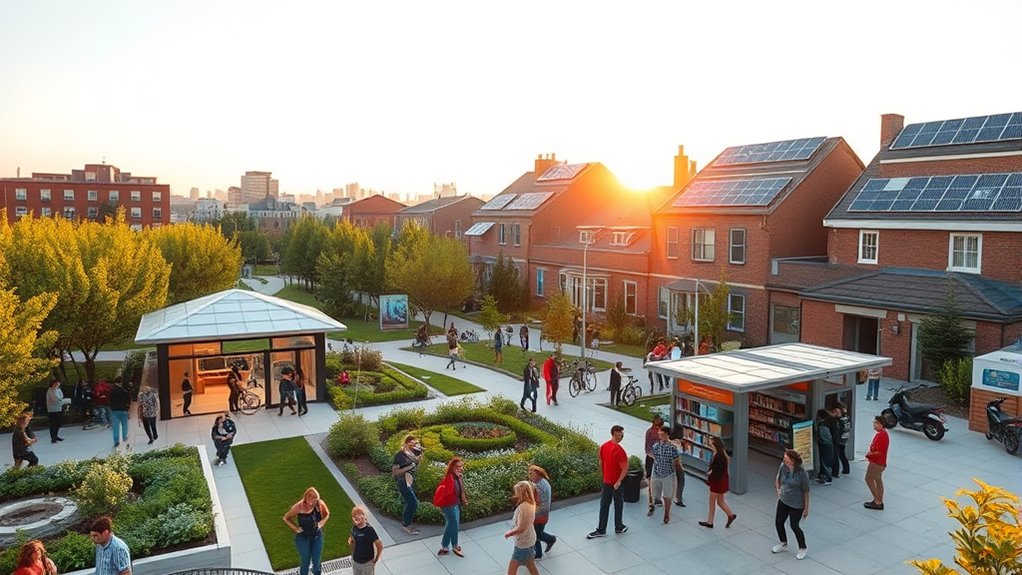Beyond UBI, you can explore radical ideas like embracing post-scarcity economies fueled by technological abundance, which reduces dependence on jobs. Rethinking social security with Universal Basic Services guarantees essential needs without employment. Implementing automation taxes can fund social programs and worker retraining, while fostering volunteerism and community engagement builds resilience. These approaches aim for a sustainable, inclusive society—if you’re curious how these innovative strategies come together, there’s more to uncover ahead.
Key Takeaways
- Implement resource-sharing and collective ownership models to prioritize community well-being over individual employment.
- Develop Universal Basic Services (UBS) providing essential needs like healthcare, education, and housing based on necessity.
- Promote automation taxes and innovative funding sources such as sovereign wealth funds to finance social safety nets.
- Encourage community-led initiatives, volunteerism, and digital platforms to build social resilience and economic value.
- Rethink societal success metrics beyond employment, fostering cultural, environmental, and social sustainability.
Embracing Post-Scarcity Economics and Technological Abundance

As technology advances, we’re moving toward a post-scarcity economy where goods and services become universally accessible thanks to automation, AI, and renewable energy. In this system, basic needs like food, healthcare, housing, and education are provided free and unconditionally, removing the need for traditional markets and prices. Automation and smart manufacturing reduce human labor, while abundant renewable energy fuels sustainable production. Enhanced recycling and synthetic materials lessen resource scarcity, and digital technologies enable free access to information and services. The integration of fraud detection techniques ensures secure transactions in this new economy, maintaining trust and stability. In this future, society shifts from survival to focusing on fulfillment, creativity, and connection. The economy no longer relies on competition or scarcity; instead, it’s driven by abundance, fostering new ways to meet human needs and redefine prosperity. Additionally, innovations in home theatre technology, such as high-quality projectors and custom screens, exemplify how technological abundance enriches cultural experiences and personal entertainment. Promoting mindful consumption ensures resources are used responsibly and sustainably in this era of abundance. Recognizing the role of dreams in shaping human aspirations can inspire innovative approaches to collective well-being and cultural development. Embracing technological abundance can also inspire new forms of community building and shared cultural practices that enhance social well-being.
Rethinking Social Security With Universal Basic Services

Rethinking social security through Universal Basic Services (UBS) offers a compelling alternative to traditional income-based support systems. Instead of cash transfers, UBS guarantees access to essential services such as health, education, housing, and energy based on need. This approach directly addresses basic needs, reducing inequality and promoting social equity. Providing free public services like transportation and care can be more efficient than relying on private markets, while also ensuring everyone’s fundamental rights. UBS fosters a post-growth economy focused on sustainability, with environmental benefits from accessible green energy and transport. Existing public systems exemplify these principles despite ongoing political and fiscal challenges. Implementing UBS requires strong political will and public engagement, but international collaboration and learning from best practices can improve its success. For example, integrating public infrastructure into social security strategies can enhance service delivery and accessibility. Additionally, leveraging social infrastructure can improve community resilience and long-term sustainability. Incorporating community-based services can further tailor support to local needs and foster social cohesion. A focus on preventative healthcare within the framework of UBS can lead to healthier populations while reducing long-term costs. Ultimately, UBS enhances social security by ensuring access rather than income, creating resilient and equitable communities.
Implementing Automation Taxes and New Funding Models

Implementing automation taxes and exploring new funding models are essential steps toward sustaining an economy that thrives despite widespread job automation. Automation taxes could generate revenue to fund social programs or retraining, helping displaced workers. However, they require careful planning to avoid slowing economic growth and to address potential relocation of companies across borders. Technological challenges include developing systems to monitor automation levels accurately. New funding models, like sovereign wealth funds, data-driven taxes, environmental taxes, and public-private partnerships, offer alternative revenue streams. Blockchain and AI can improve transparency and efficiency in tax collection. These strategies aim to balance encouraging technological innovation while providing financial stability, ensuring that economic benefits from automation support societal well-being rather than exacerbate inequality. Incorporating mental health support initiatives for displaced workers can facilitate smoother transitions and promote overall societal resilience. Additionally, leveraging personality assessment tools can help tailor retraining programs to individual strengths, increasing their effectiveness and engagement. Recognizing the importance of personalized approaches can further optimize the retraining process and ensure inclusive economic growth, especially as automation advancements continue to reshape job markets worldwide. Furthermore, integrating innovative funding mechanisms can provide sustainable financial sources to support ongoing adaptation efforts.
Cultivating a Society Focused on Volunteerism and Community Engagement

Building a resilient economy in a future shaped by automation requires more than new taxes and funding models; it depends on strengthening the social fabric through volunteerism and community engagement. Imagine a community where:
- Youth and students lead local initiatives, gaining skills and fostering connection.
- Volunteers from diverse backgrounds break down barriers, creating inclusive spaces.
- Skilled professionals use their expertise to solve pressing societal problems through pro bono work.
- Digital platforms connect and inspire younger generations to participate actively.
Recently, volunteer participation rebounded to 28.3%, signaling renewed engagement. The value of volunteer hours now exceeds $34.79 per hour, highlighting their economic importance. Volunteer participation has fluctuated over the years, with a recent rebound, and by nurturing volunteerism across demographics and leveraging technology, you help build a society that thrives without traditional jobs, fostering resilience and connection. Incorporating social capital can significantly enhance community cohesion and long-term sustainability. Understanding the role of Kia Tuning can also inspire innovative approaches to community development, emphasizing customization and local adaptation. Recognizing the importance of vetted information ensures that community initiatives are based on reliable and effective strategies for sustainable growth. Additionally, fostering a culture of community-driven projects encourages collective ownership and long-lasting impact.
Frequently Asked Questions
How Would Radical Economic Models Address Income Inequality Long-Term?
You ask how radical economic models could tackle income inequality long-term. These models focus on redistributing wealth through policies like radical redistribution every 50 years, universal inheritance, and progressive taxes. They promote equal access to education, devolution of power, and reform corporate practices. By fostering knowledge jobs and supporting social cohesion, you can create a fairer economy that reduces disparities and builds lasting societal trust and unity.
What Are Potential Environmental Impacts of Post-Scarcity Economies?
Have you considered how post-scarcity economies impact the environment? You might think that abundant resource use and automation could harm ecosystems, but with circular practices and renewable energy, you can minimize waste and pollution. By reducing land degradation and conserving biodiversity, these economies could actually promote environmental restoration. Still, the true challenge lies in managing the ecological risks of new technologies and ensuring energy demands don’t outweigh sustainability efforts.
How Can Governments Ensure Social Cohesion Without Traditional Employment?
You can foster social cohesion by promoting community engagement outside traditional work. Encourage volunteering, civic participation, and cultural activities that give people purpose and belonging. Support education and lifelong learning platforms, and recognize caregiving roles. Invest in social infrastructure and create policies that facilitate shared purpose through cooperatives and community projects. These efforts help build trust, inclusiveness, and social bonds, ensuring society remains connected even without conventional employment.
What Are Risks of Technological Dependence in a Post-Work Society?
You might not realize it, but relying heavily on technology in a post-work society brings serious risks. You could face increased social isolation and mental health issues from too much screen time. Job displacement is real, and dependence on infrastructure makes you vulnerable to disruptions. Plus, rising inequality and skills loss threaten societal balance. Staying connected and balanced becomes essential as we navigate the challenges of technological dependence together.
How Might Global Cooperation Evolve in Radically Restructured Economies?
You’ll see global cooperation evolve through stronger multilateral frameworks addressing shared challenges like debt crises and economic shocks. As economies radically restructure, nations will need to coordinate more on issues like resource distribution and technological regulation. By reforming institutions and fostering mutual trust, you can expect increased collaboration that promotes stability, innovation, and resilience, ensuring all countries benefit from interconnected growth and collective problem-solving in this new economic landscape.
Conclusion
By exploring these radical ideas, you challenge the notion that jobs are essential for prosperity. Embracing post-scarcity economics and universal services can foster abundance, while automation taxes could fund societal needs. Research suggests that societies prioritizing community and volunteerism often experience higher well-being and resilience. If you rethink traditional economic models and embrace technological potential, you could help create a sustainable future where everyone thrives without being tied to employment.









